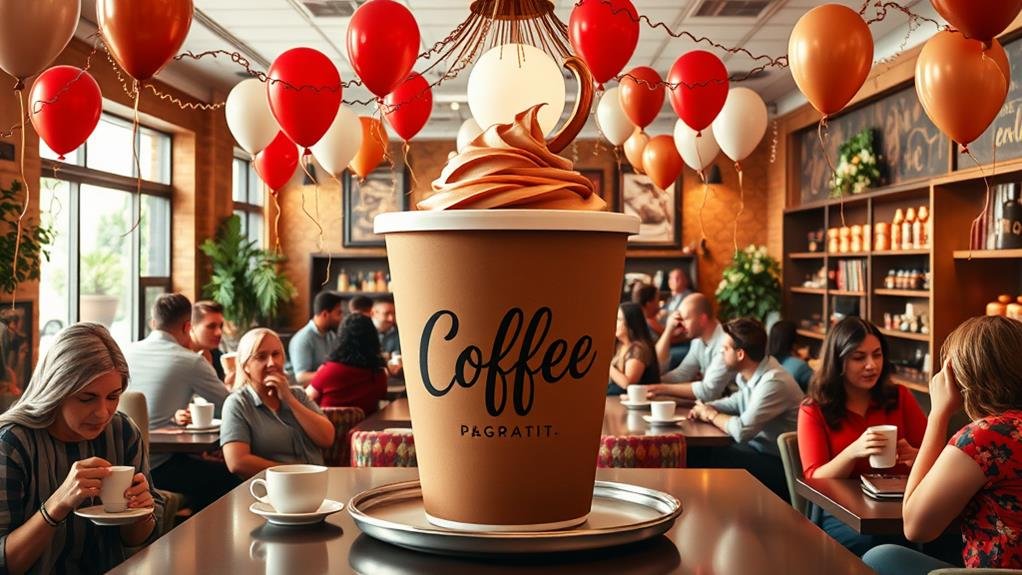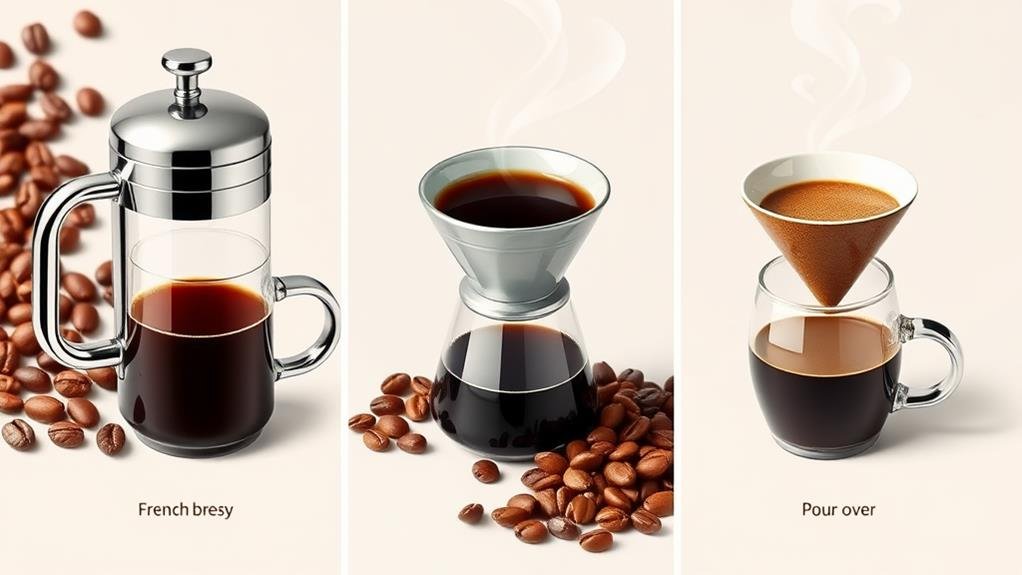As someone who can't start the day without a cup of coffee, I find it fascinating that Americans collectively consume a staggering 400 million cups daily. This widespread love for coffee is celebrated annually on National Coffee Day, which falls on September 29 in the United States. This tradition was initiated by the Southern Food and Beverage Museum in New Orleans back in 2009. But what makes this day special? Let's explore how this celebration came about and what you can do to join in on the fun.
Celebrating National Coffee Day

Celebrating National Coffee Day is a tradition that many coffee lovers excitedly anticipate each year. In the U.S., this special day to celebrate our beloved beverage falls on September 29. The Southern Food and Beverage Museum in New Orleans kick-started this celebration back in 2009, and since then, it has become a cherished event for coffee enthusiasts across the country. Many people take the time to appreciate their daily cup of joe and explore different brewing techniques, such as using a gooseneck kettle for precise pouring. For the average adult in the U.S., drinking coffee is more than just a morning ritual; it's an integral part of daily life. In fact, Americans collectively drink 400 million cups of coffee every day, with each adult consuming approximately 2.7 cups.
This day serves as an opportunity to not only enjoy your favorite coffee but also to learn about its rich history and cultural significance. Whether you prefer it strong and black or flavored with cream and sugar, National Coffee Day is your chance to indulge and celebrate the simple joy of drinking coffee. So mark your calendar for September 29 and get ready to toast your cup with other coffee aficionados across the nation.
Coffee History and Origins
As I savor my cup of coffee on National Coffee Day, I find myself curious about the origins of this beloved beverage. Coffee has a rich history that spans centuries and continents. The journey of coffee began in the 15th century in Yemen, where it was first cultivated. From there, it spread to Europe, Indonesia, and eventually the Americas. The global coffee consumption today highlights how integral this beverage has become, with approximately 1.4 billion cups consumed daily around the world. Brazil is now the largest coffee producer globally, with Colombia closely following behind. This shift from its Middle Eastern roots to becoming a staple in various parts of the world reflects the significant role of global trade and cultural exchange in shaping its history. The coffee trade itself started in the 1400s and reached the American colonies by the mid-1600s. Blind tasting methods guarantee that coffee evaluation remains fair and consistent, further emphasizing the care taken in appreciating this drink. Today, over 50 countries cultivate coffee, offering a diverse range of flavors that cater to different tastes. This diversity underscores how deeply intertwined coffee is with global trade and cultural practices. Understanding the origins and history of coffee not only appreciates its flavor but also acknowledges its impact on societies worldwide. As I relish each sip on National Coffee Day, I am reminded of this intricate yet fascinating story behind my cup.
Brewing Methods and Flavor

When it comes to savoring a cup of coffee, the brewing method can greatly alter the flavor profile. On National Coffee Day, you might want to explore different brewing methods to improve your coffee experience. Here's a brief look at how various techniques can reveal diverse flavors:
| Brewing Method | Flavor Profile | Key Characteristics |
|---|---|---|
| French Press | Rich, bold, and full-bodied | Immerses grounds in water; no filter used |
| Chemex | Smooth, balanced, and clean | Uses a glass container with a paper filter |
| Cold-Brew | Mellow, sweet, and low acidity | Steeps coarse grounds in cold water for hours |
Each method brings out unique aspects of the coffee beans. For example, French press yields a richer flavor due to the immersion process, while Chemex produces a cleaner taste thanks to its paper filter. Cold-brew, on the other hand, results in a smoother coffee with reduced acidity. The type of coffee bean itself also plays a pivotal role; beans from higher elevation farms are often of higher quality and offer a richer taste. Whether you're celebrating National Coffee Day or just enjoying your daily cup, experimenting with these brewing methods can markedly improve your coffee experience.
Global Coffee Celebrations
On various dates throughout the year, coffee aficionados around the globe come together to celebrate their shared passion for coffee. This phenomenon highlights the diverse nature of global coffee celebrations. Different countries have chosen specific days to honor this beloved beverage, each reflecting their unique coffee culture and traditions.
For instance, Costa Rica observes National Coffee Day on September 12, while Ireland celebrates it on September 19. Japan joins the international community on October 1, which is also recognized as International Coffee Day in many countries. Brazil, meanwhile, honors its coffee heritage on May 24. These varied dates underscore the universal appeal of coffee and the diverse ways it is appreciated.
The celebrations themselves are as varied as the dates. Each country brings its own twist to the festivities, showcasing local customs and coffee-making traditions. Whether it's through special brews, coffee festivals, or simple gatherings over a cup of joe, these global coffee celebrations demonstrate a deep and widespread love for coffee. This diversity not only enriches the global coffee culture but also fosters a sense of community among coffee enthusiasts worldwide.
Ways to Observe the Day

Celebrating National Coffee Day on September 29 offers a multitude of engaging ways to honor this beloved beverage. Here are a few ways you can observe the day:
- Enjoy Your Favorite Coffee: Take a moment to savor a cup of your favorite coffee, whether it's a rich espresso, a smooth latte, or a classic drip brew.
- Explore Different Brewing Methods: Try out different brewing methods like French press or Chemex to enhance your coffee experience and discover new flavors.
- Share on Social Media: Share your love for coffee on social media using the hashtag #NationalCoffeeDay, making it easy to connect with fellow coffee enthusiasts.
- Look for Special Deals: Check out special deals and promotions from coffee shops and brands on National Coffee Day; many offer discounts and freebies to celebrate.
Conclusion
As it happens, National Coffee Day coincides perfectly with the autumn season, a time when many of us find comfort in a warm cup of coffee. Celebrated on September 29, this day allows us to appreciate the rich history, diverse brewing methods, and global celebrations of coffee. Whether you savor your coffee at home or at a favorite café, National Coffee Day is the perfect excuse to indulge in this beloved beverage and appreciate its cultural significance.

